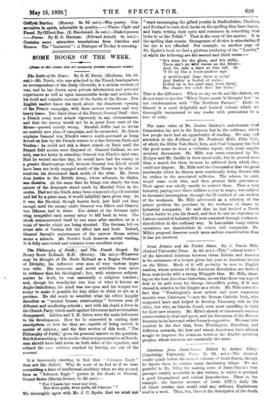SOME BOOKS OF TILE WEEK.
[MOW in Ws column does .sot vasossarily prided* sobseparst review]
The Battle of the Marne. By G. H. Perris. (Methuen. 10s. 6d. net.)—Mr. Perris, who was attached to the French headquarters as correspondent of the Doi/i/ Ohronicle, is a serious student of war, and he has drawn upon private information and personal experienoes as well as upon innumerable books and articles for his lucid and valuable account of the battle of the Memo. Few English readers know the truth about the disastrous opening of the French -campaign, with three serious reverses and very heavy losses. Two fixed ideas of the French General Staff—that a French army must attack vigorously in any circumstances, and that the enemy would not be in great force west of the Meese—proved utterly wrong. Marshal Joffre had to devise *II entirely new plan of campaign, and he succeeded. Mr. Perris explains General von Muck's swerve south-eastward as being domed on -him 13y-the French retreat to a line between Paris and Verdun he could not risk a direct attack on Paris until the Preach field armies were disposed of. General Gallieni, we are told, was -too hasty in attacking General von Kluck's right rear. Had he waited another day, he would have had the enemy at a greater disadvantage still, beoause General von Kluck would have been too hotly engaged south of the Memo to be able to reinforce his threatened flank north of the river. _Mr. Perris does justice to the British Army, whose advance, he thinks, was decisive. At the same time he brings out olearly the true nature of the desperate stand made by Marshal Pooh in the centre. Had not the Ninth Army been composed of good material and led by a great man, it would infallibly have given way. As it was, the Marshal, though beaten back, just held out long enough until the enemy under General von Billow and General von Hausen had to retire. The defeat of the German right wing compelled each enemy army to fall back in turn. The shook communicated itself to one mass after another, as in a train of trucks whioh are being shunted. The German left on either side of Verdun felt the effect last and least. Indeed, General Sarrail's maintenance of the narrow Meuse salient seems a miracle. Mr. Ferris's book deserves careful reading. It is fully annotated and contains some excellent maps.










































 Previous page
Previous page